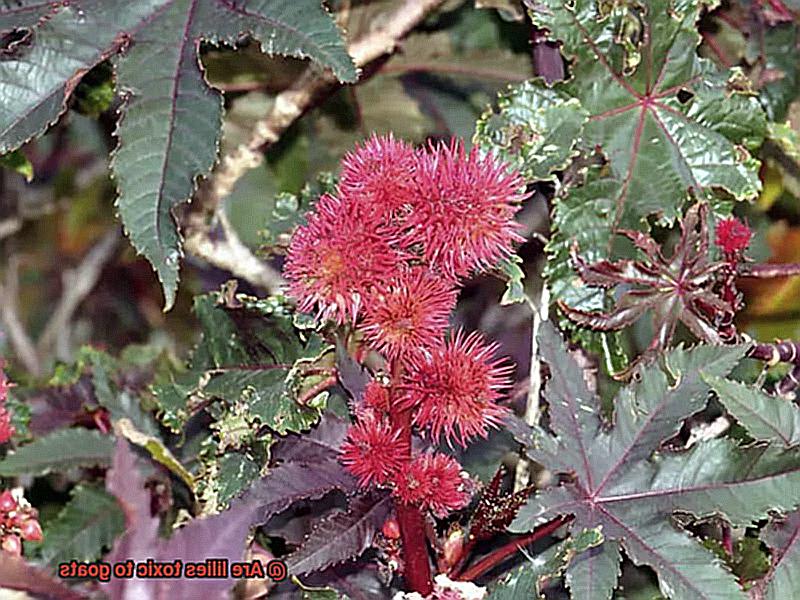Hey there, goat owners. Are you curious about whether lilies are toxic to your furry friends? Maybe you’ve got a lily-filled garden and you’re worried about your goats munching on the wrong thing. As an animal expert, I know how crucial it is to be aware of what plants could harm your goats.
Lilies are known for their gorgeous blooms and sweet scent, but they have a dark side too. Unfortunately, they’re highly toxic to goats and can even be fatal if ingested. It’s shocking to think that something so beautiful could pose such a threat to our beloved animals.
In this blog post, we’ll dive deeper into the question of whether lilies are toxic to goats or not. We’ll explore the symptoms that may arise if your goat ingests lilies, and what steps you should take if you suspect your goat is suffering from lily toxicity.
Keeping our goats safe and healthy is our top priority as owners. That’s why it’s essential to educate ourselves about potentially harmful plants like lilies. So let’s get started and learn all there is to know about how these stunning flowers can impact the health of our goats.
What are Lilies?
Contents
Lilies are a fascinating ornamental plant that belongs to the family Liliaceae. These herbaceous flowers come in an array of colors, shapes, and sizes that create a stunning sight for any garden enthusiast. Lilies have six trumpet-shaped petals and are known for their fragrant aroma that can fill a room with a sweet scent.
There are several types of lilies, including Asiatic lilies, Oriental lilies, Easter lilies, and Daylilies. The Asiatic lilies are the easiest to cultivate and come in a wide range of colors to suit any garden design. Oriental lilies are famous for their fragrant blooms and larger flowers that add elegance to any space. Easter lilies have a special place in our hearts as they are associated with the Easter holiday and have white trumpet-shaped flowers that symbolize purity and new beginnings. Daylilies may have a shorter bloom time than other varieties but make up for it with their vast color range.
Lilies grow natively in many parts of the world, including North America, Europe, Asia, and Australia. They are commonly used in gardens and as cut flowers due to their beauty and fragrance. However, it is crucial to note that not all parts of the lily plant are safe for consumption by animals such as goats.
Lilies contain cardiac glycosides that make them hazardous to several animals, including cats, dogs, and goats. If ingested, these compounds can cause heart failure and other serious health issues. Symptoms of lily toxicity in goats include vomiting, diarrhea, loss of appetite, lethargy, and rapid heart rate.
It is essential to note that some varieties of lilies are more toxic than others. The Easter Lily or Tiger Lily is considered more dangerous than other varieties. Therefore, it is best to avoid feeding any type of lily to your goats.
As a goat owner, it is crucial to be aware of the potential dangers of common household plants and take necessary steps to keep your animals safe and healthy. If you suspect that your goat has consumed lilies or any other toxic plants, seek veterinary care immediately to prevent serious health problems or even death. Additionally, it is essential to keep all potentially hazardous plants out of reach of your goats to prevent accidental ingestion.

Are Lilies Toxic to Goats?
Lilies are stunning flowers that can add a touch of elegance to any setting. However, if you’re a goat owner, you need to be aware that these beautiful blooms can pose a serious threat to your furry friends.
The reason for this is due to the presence of glycosides in lilies, which can cause severe poisoning in goats if ingested. If your goat eats lilies, they may experience alarming symptoms such as vomiting, diarrhea, abdominal pain, dehydration, and even death in severe cases. Therefore, it’s important to keep your goats away from any type of lily.
It’s worth noting that not all lilies are toxic to goats. However, it’s difficult for even the most experienced botanists to differentiate between toxic and non-toxic varieties. For this reason, it’s best to err on the side of caution and avoid feeding any type of lily to your goats altogether.
If you have lilies growing in your garden or flower beds, make sure they are kept well away from areas where goats graze or have access to. Prevention is always better than cure when it comes to protecting your goats from lily poisoning.
In the event that your goat does ingest lilies, it’s crucial that you seek professional veterinary care immediately. Your vet may recommend treatment such as inducing vomiting, administering activated charcoal, and providing fluid therapy.
What Causes the Toxicity in Lilies?
The answer lies in the presence of certain chemical compounds, such as cardiac glycosides and alkaloids.
Cardiac glycosides are chemicals that affect the heart, causing irregular heartbeats or even heart failure. Alkaloids, on the other hand, affect the nervous system, leading to symptoms such as tremors, seizures, and paralysis. These harmful substances are present in various parts of the plant, including the flowers, leaves, stems, and bulbs.
It’s important to note that not all lilies are toxic to goats. Some species, such as daylilies (Hemerocallis spp.), Easter lilies (Lilium longiflorum), and Asiatic lilies (Lilium asiatic), are considered non-toxic. However, it’s still vital to exercise caution when introducing any new plant into your goat’s diet.

As a responsible goat owner, it’s crucial to keep these stunning blooms away from your furry friends and seek professional veterinary care immediately if they do ingest them. Prevention is always better than cure. So make sure you know which species of lilies are toxic and take precautions when introducing any new plants into your goat’s diet.
Symptoms of Lily Toxicity in Goats
Lily toxicity in goats can cause a range of severe symptoms that require urgent attention. As an expert on this topic, I’ve researched and compiled some critical information to help you recognize the symptoms of lily toxicity in your goats.

The most common signs of lily toxicity in goats include vomiting, diarrhea, loss of appetite, lethargy, and depression. These symptoms can occur within a few hours of ingestion and can last for several days. It’s crucial to note that the severity of the symptoms will depend on the amount of lilies ingested and the individual goat’s health status.
Apart from these symptoms, goats that have ingested lilies may also show signs of dehydration such as dry mouth, sunken eyes, and decreased urination. In severe cases, they may experience seizures, tremors, and even fall into a coma. If you suspect that your goat has ingested lilies, it is essential to seek veterinary care immediately.
When it comes to treating lily toxicity in goats, time is of the essence. A veterinarian can perform a physical examination and run diagnostic tests to determine the extent of the toxicity and provide appropriate treatment. The treatment may involve administering medications to control vomiting and diarrhea, as well as intravenous fluids to treat dehydration. In severe cases, hospitalization may be necessary to provide supportive care and monitoring.
Prevention is better than cure when it comes to lily toxicity in goats. It’s critical to keep lilies and other toxic plants out of reach of goats by fencing off areas where these plants grow or removing them from the property altogether. Educating yourself on the types of plants that are toxic to goats can also help prevent accidental ingestion.
Varieties of Lilies and Their Toxicity Levels
It’s essential to know which plants are safe for your furry friends, especially when it comes to lilies. These popular flowers come in various colors, shapes, and sizes, but not all lilies are created equal. In this post, we’ll dive into the different varieties of lilies and their toxicity levels for goats.
The Easter lily, tiger lily, daylily, Asiatic lily, and Oriental lily are the most toxic lily species for goats. These lilies contain harmful toxins such as cardiac glycosides, colchicine, and oxalic acid that can wreak havoc on your goat’s gastrointestinal tract, kidneys, and liver. Ingestion of these toxic lilies can lead to severe symptoms like vomiting, diarrhea, abdominal pain, lethargy, tremors, seizures, and even death.
There are some lily species that are safe for goats to consume. The Madonna lily, Turk’s cap lily, and the Martagon lily do not contain any harmful toxins and are completely safe for goats to eat.
To ensure your goats steer clear of toxic plants like lilies, take precautions to prevent them from accessing areas where these dangerous plants grow. Consider fencing off gardens or removing toxic plants entirely.
Preventing Accidental Ingestion of Lilies
These beautiful flowers may contain toxins that can make your goats sick, so it’s crucial to take steps to prevent accidental ingestion.
The first step in protecting your goats is to ensure that their pasture is free from lilies. This means removing any existing lilies and keeping an eye out for new growth. If there are lilies nearby, consider installing a fence around the pasture to keep your goats away from areas where these toxic flowers may be present.
In addition, it’s important to be careful about what plants and flowers you bring into the barn or feeding areas. Always check the labels to make sure they’re safe for your goats. If you’re not sure, it’s better to err on the side of caution and avoid introducing them altogether.
Of course, prevention is only part of the equation. It’s also essential to keep a close eye on your goats for any signs of illness or distress. Symptoms of lily toxicity can include vomiting, diarrhea, loss of appetite, and lethargy. If you notice any of these symptoms, contact your veterinarian right away.
yRvtsjBzjsM” >
Conclusion
To sum it up, lilies may be a sight for sore eyes, but they can also be deadly to your goat companions. Remember that these flowers contain harmful substances such as alkaloids and cardiac glycosides that can lead to severe poisoning in goats if ingested.
If you notice symptoms such as vomiting, diarrhea, lethargy, or loss of appetite in your goats, it’s imperative to seek veterinary care right away. Prevention is key when it comes to protecting your furry friends from lily toxicity. Keep all hazardous plants out of reach by fencing off areas where they grow or removing them altogether.
It’s essential to educate yourself on the types of plants that are toxic to goats and take necessary precautions before introducing any new vegetation into their diet.






